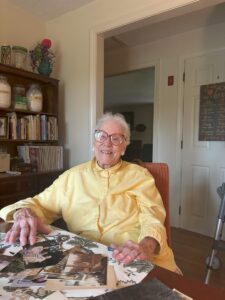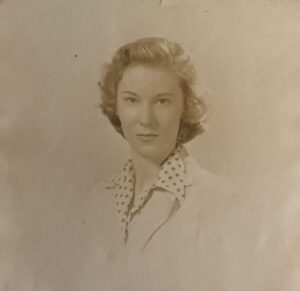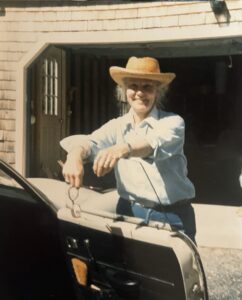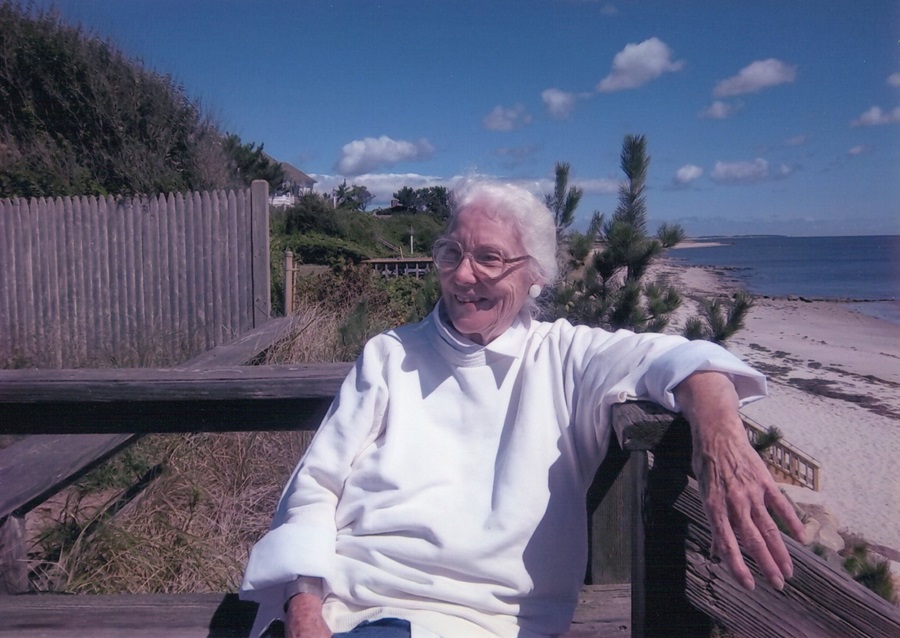WELLFLEET — Of the past 100 years, Grace Ebert remembers only the exceedingly good and exceedingly bad days.
“If I have to think hard to remember a day, it could not have been that important,” she says. “If it was that important, I would have remembered it.”
Among the memories that have achieved permanence in the mind of Wellfleet’s newest centenarian: riding a tricycle along New York’s 8th Avenue as the city broke ground for construction of the A Train; meeting her future husband at Bronx Park; visiting Wellfleet for the first time in 1946.

Two months after her 100th birthday, Ebert sits for an interview at the dining room table in her Wellfleet home — a house deep in the woods on Haywain Way, built on land she and her late husband bought in 1968. She comes prepared: atop a fruit-printed placemat, she displays dozens of photographs, taken at different times in her life.
Ebert was born in 1924 in the Bronx, N.Y., and although she’s lived in Wellfleet since 1984, she still considers herself a New Yorker. As she talks about her young life in that city’s northernmost borough, she recalls its geography with striking specificity. Using items on the table as props, she maps out New York City’s boroughs and sets the scene for the stories that unfolded in them.
“You can tell I’m from the Bronx, because in the Bronx they talk with their hands,” Ebert jokes, gesticulating energetically.
Ebert grew up surrounded by women. She was raised by a single mother in a house shared with her grandmother, aunt, and cousin Richard. She smiles reflecting on the resilience she says she extracted from her New York childhood. It’s a toughness that is still evident a century later. When she reaches for a photo on a nearby counter, her son Edward offers a helping hand, which she swats away. “He’s always trying to help me, even though I don’t need it,” she says.

Ebert’s love story with her late husband, George, began in a quintessentially New York way. The pair met in Bronx Park one summer evening when George was 17 and Ebert was 12 — though she told him she was 15.
Wearing bobby socks and a cotton print dress, the preteen Grace Armstrong and a classmate approached George and his friend, Frank. The four talked all night. The next night — and most nights after that — she returned to the park alone and met George. Their summer rendezvous would become a daily ritual in the years to come, though Ebert says that for a long time it was strictly platonic: “We just chit-chatted. It was never a case of boyfriend-girlfriend.”
Eventually, Grace and George’s friendship blossomed into romance, and the two married in 1944, eight years after meeting. They would go on to have four children, two grandchildren, and six great-grandchildren. George died in 2006.
Ebert recalls her first job, which came after she graduated from Katherine Gibbs Secretarial School in New York City. She was a secretary to the passenger agent on the Pennsylvania Railroad, which meant typing up letters for train passengers — almost always men — so that they could be dropped off for delivery at different stops along the rail route. It’s a job that doesn’t exist anymore, Ebert sighs. “Of course. Now, everybody has one of those little flip-flop ear things,” she says, picking up a reporter’s mobile phone from the table and shaking it next to her ear.
Although her primary route was back and forth between Pittsburgh and Washington, D.C., because of her skill, and, it seems, her reliability, Ebert was often tapped to fill in along other routes for secretaries who had to miss work “because they smoked and drank when they shouldn’t have. That was one of my good points, that I didn’t do that.”

Midway through her nine-year tenure on the railroad, Grace and her husband relocated to New Jersey — living first in East Rutherford and then Cresskill. Though she acquiesced to raising her boys in New Jersey, Ebert drew the line at giving birth to them there — each time she went into labor, she insisted that George drive her to a hospital in New York City.
When asked what she thought about living in New Jersey, Ebert faked a gag. “Nobody should live in New Jersey when you can live in New York,” she says. “Don’t ask me why I lived there. I have no idea.”
There seems to be only one place in the world that brings Ebert as much joy as New York: Wellfleet.
Grace and George first visited Wellfleet in 1946 shortly after getting married. Within hours of arriving, she says she knew it was the place she wanted to retire. They bought land and built a house — the same one where Ebert celebrated her 100th birthday — in 1969.
Ebert struggled to put into words what exactly about Cape Cod drew her in. “You either like something or you don’t,” she says. “You’re either attached to something or you’re not. I just love it here. I have a feeling for this area. That’s why I’m here.”

Ebert was instrumental in the building of the current Wellfleet Public Library, which opened in 1989, according to former Library Director Elaine McIlroy. Serving on the library building fund committee from 1986 to 1990, Ebert planned various fundraising and outreach events that made the project possible.
“I couldn’t believe how generous she was with her time,” McIlroy says. Ebert remained involved with the Friends of the Wellfleet Library until recently. Among her many contributions was a years-long quest to transfer more than 200 local history videos from VHS tape to DVD.
Among her neighbors, Ebert is known for her hospitality. Mary Ellen Manning recalled an afternoon get-together where Ebert gave her “the full British experience” — warm tea and fresh-baked pastries served on a three-tiered tray. “She just made me feel really special.”
These days, Ebert’s schedule is more leisurely. She lives alone and is visited frequently by Edward, who lives a mile away. Rather than “doing things,” she says she prefers to spend her time simply thinking.
“I can waste my time thinking all day,” she says matter-of-factly. “I don’t do things minute-wise. When I think, I really, really think.”
Ebert brushed off questions about the significance of reaching triple digits. “Age doesn’t mean anything to me,” she says. Her hundredth year, she says, was just the same as every year that preceded it, and she’s confident that pattern will continue. But to translate her philosophy into current parlance, she advises living in the present moment: “Enjoy every day that you’re alive. If you have a happy moment in every day, you’re well on your way.”



